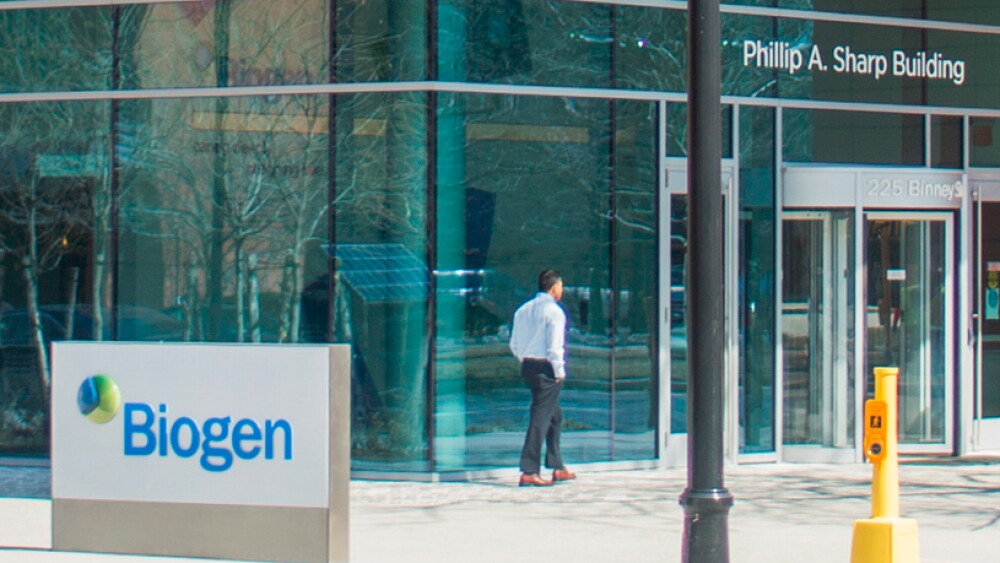March 17, 2017
By Mark Terry, BioSpace.com Breaking News Staff
In what feels a bit like a self-fulfilling prophecy, two analyst firms downgraded Biogen , causing the stock to drop.
Both Leerink and Morgan Stanley downgraded Biogen, citing slow sales for the company’s new drug for spinal muscular atrophy, Spinraza, and no near-term catalysts.
Geoffrey Porges and Bradley Canino, writing for Leerink, said, “Our downgrade is based on a slower than expected ramp for Spinraza, and the completion of the series of important catalysts that have evolved over the last few months. Our revenue forecast for the company is reduced by 1 percent for 2017, and then by 2 to 3 percent in later years. These adjusted forecasts are now more or less in line with consensus, and in fact consensus expectations for Spinraza have also been reduced recently.”
Spinraza was approved early this year to treat spinal muscular atrophy (SMA). SMA is a rare, autosomal recessive neuromuscular disease characterized by the degeneration of alpha motor neurons in the spinal cord. This results in progressive muscle weakness and paralysis. According to the Orphanet Journal of Rare Diseases, the estimated incidence is 1 in 6,000 to 1 in 10,000 live births.
One of the problems with Spinraza appears to be the price. It is priced at $750,000 for the first year and $375,000 for each year afterwards. Patients receive six injections in the first year at about $125,000 per shot.
Morgan Stanely’s Matthew Harrison downgraded the stock from “Market Weight” to “Overweight,” saying it was “not a downside call, but a timing call.”
The analysts are also looking down the road to Biogen’s Alzheimer’s drug, aducanumab. The drug is promising, but high risk, and results are probably two or more years down the road. And, it’s not completely clear exactly how promising the drug is. In early trials, it’s showed promise, but that’s true of literally dozens of Alzheimer’s drugs that failed in late-stage trials. Aducanumab attacks amyloid plaques, but other drugs that seem to successfully clear amyloid plaques don’t seem to lead to improvements in cognition and memory. It’s possible that the damage has already been done and the drugs don’t really improve that, or it’s possible that there’s a fundamental lack of understanding about the disease and the role of amyloid plaques.
Daniel Alkon, chief scientific officer of Neurotrope , which is taking another approach to Alzheimer’s drug development, told Benzinga after Merck ’s Alzheimer’s drug failed, “These trials are not working, and moving it up earlier and earlier is not going to change it. Look at Biogen’s trial. What people don’t realize is that Biogen moved their trial so far up that there wasn’t one Alzheimer’s patient in the trial. They only look at people who were mild cognitively impaired or confused. Only half of which go on to get Alzheimer’s.”
Although perhaps the drug would be effective as a preventative. Results for aducanumab won’t be available until 2019.
Porges, in his note to investors, said, “What was previously mostly opportunity for Biogen’s stock (trial results, new product launch, takeout potential) has now shifted to risk, with significant competitors approaching for Biogen’s critical MS franchise, slower than expected near term adoption of Spinraza, and at least two more years until results emerge from the company’s Alzheimer’s disease program.”
On his part, Harrison noted that over the long-term, he was positive about Biogen and its Alzheimer’s drug, but “we see limited near-term upside.”
Biogen are currently trading for $278.96. The company’s yearly high was on August 2, 2016, when it traded for $330.11. The low was June 27, 2016, when shares traded for $224.60.





